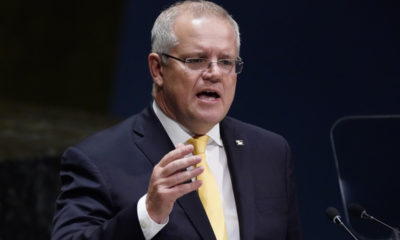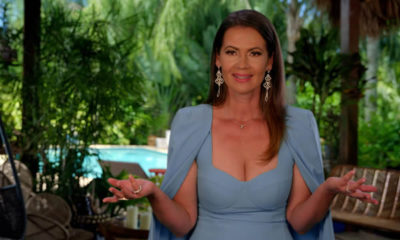Sports
Aussie tennis legend under fire for anti-LGBT comments
Unclear if calls to rename Margaret Court Arena gaining traction
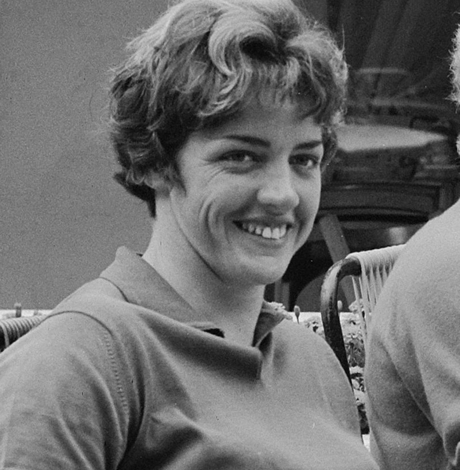
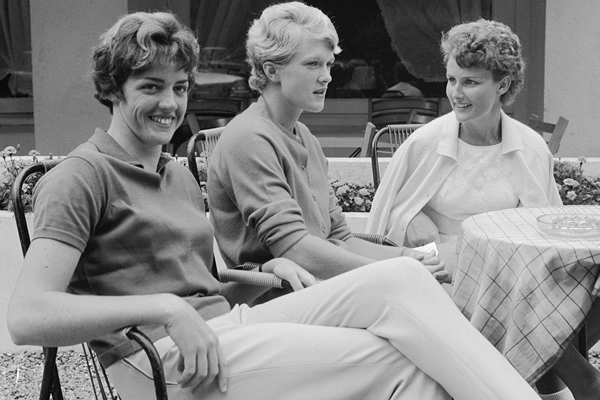
Margaret Court, left, in her ‘70s heyday on the international tennis scene. (Photo by Eric Koch of ANEFO; courtesy of the Dutch National Archives)
Tennis players, rock bands, activists and others in Australia and beyond are calling for the Margaret Court Arena, a tennis and entertainment venue in Melbourne, Victoria, to be renamed because of the controversial, anti-gay views of its namesake.
The arena, built in 1987 (it holds 7,500), is part of the National Tennis Centre at Melbourne Park, itself part of the Melbourne Sports and Entertainment Precinct. It opened in 1988 as Show Court One but was renamed in 2003 after Court, the country’s most successful female tennis player of all time.
Court, 75, was the first woman in the open era (pros/amateurs competing jointly) to win the singles Grand Slam (all four major tennis tournaments in the same calendar year); she was only the second woman in history to do it. With 24 solo wins, 19 women’s doubles wins and 21 mixed doubles titles, she holds a record 64 major titles overall. Several of her records still stand. In 2010, Aussie newspaper the Herald Sun called her “the greatest female tennis player of all time.”
Raised Catholic, Court became a Pentecostal after retiring from tennis in 1977. She was ordained an independent Pentecostal minister in 1991. After founding Margaret Court Ministries, she founded the Victory Life Centre, a Perth-based Pentecostal church, in 1995. She is its senior pastor and broadcasts of her preaching are aired on Australian TV.
She has been an anti-LGBT crusader for years inspiring an effort that began in 2012 for the arena bearing her name to be renamed. Although the issue has been percolating, it reached a boil in May when Court wrote a letter to the West Australian (a Perth newspaper) criticizing Qantas, Australia’s largest domestic airline, for being a corporate supporter of same-sex marriage (currently illegal; a national mail-in vote is in the works) and claiming she would boycott the airline.
In a follow-up interview with Vision Christian Radio, she said lesbian tennis players try to lead young players “into parties,” implying they recruit using tactics similar to Hitler and communism. Of trans issues, she said, “That’s all the devil.”
Out tennis legend Martina Navratilova wrote an open letter to arena owners calling for the change. Navratilova called Court an “amazing tennis player” but also “a racist and a homophobe.”
“How much blood will be on Margaret’s hands because kids will continue to get beaten for being different,” Navratilova wrote. “Too many will die by suicide because of this kind of intolerance, this kind of bashing and yes, this kind of bullying. This is not OK.”
Sigur Ros closed its “Splendour in the Grass 2017” tour in July at the Margaret Court Arena with a light show projection supporting same-sex marriage. The band sold limited edition T-shirts at the concert to raise funds for the marriage effort there. Other acts such as LCD Soundsystem, Grinspoon and Ryan Adams who’ve played there have spoken out against Court.
“I’m not one to get in old people’s faces for being ignorant, but when you come after my family, my friends … you can go fuck yourself,” said LCD Soundsystem singer James Murphy, according to a Junkee concert review.
Tennis Australia praised Court for her “unmatched playing record” but said her “personal views are her own and do not align with Tennis Australia’s values of equality, inclusion and diversity.”
Arena owners have not said if the proposed renaming is being seriously considered but said on Twitter they’re committed to equality.
LGBT Australian activists say the issue has died down some since it broke in May but differ on how significant it is.
Sally Goldner, an activist on trans and bi issues who works with three such agencies, says anti-LGBT rhetoric such as Court’s does have consequences.
“Her trans comments, which didn’t get as much coverage, were pretty extreme,” Goldner said in a Skype interview with the Blade. “To imply that trans people are possessed by the devil, that’s pretty extreme. … She gave several long interviews in mainstream media, yet to my knowledge, at no point were any trans people or families given the same amount of attention. … There’s a lot of issues below the surface beyond just the naming of the arena.”
Anthony Venn-Brown, a former Pentecostal Australian minister who left that ilk of Christianity after coming out at age 40, says that branch of the Christian faith is flourishing in Australia. Though Branch is independent, Venn-Brown says the internationally known Hillsong movement is theologically similar and “has become the largest, fastest-growing branch of Christianity in Australia.”
Venn-Brown says LGBT activists should have simply ignored Court.
“If we would have just let it go, it would have been of no consequence. … She doesn’t have a huge following, she’s not incredibly popular, her church is not huge and she’s getting to be quite old,” he said via Skype. “People are so quick to call for boycotts and names to be changed. It seems to me at times to be playground behavior. … Can’t we just take a deep breath and chill?”
Others disagree.
Filmmaker and clinical psychologist Dee Mosbacher, whose 2009 documentary “Training Rules” exposed the anti-gay policies of former Pennsylvania State University women’s basketball head coach Rene Portland, says homophobia exacts a toll.
“I know well the pain that’s caused by touting someone who is an out and proud homophobe like Rene Portland,” Mossbacher, a lesbian, says. “Some of her players thought about suicide, some felt like their whole lives were wrecked, they had symptoms of PTSD. It had a visceral effect on these women. Some of them hadn’t seen or heard anything about her for decades but it still had a tremendous effect on them. … It’s like a counter to the It Gets Better program. Holding up someone like Margaret Court as a hero is like saying it gets worse. If you allow these people to be out there with their homophobia, you’re saying it’s OK and you’re colluding with them and enabling it.”
Goldner says calls to LGBT support services “skyrocket” when anti-gay views are heavily covered in the news.
“We’ve got plenty of evidence of that,” says Goldner, who’s transgender.
She says the issue needs to be kept in perspective, though.
“We need to keep our eyes on the prize, which is full equality legally and socially,” she says. “Is renaming an arena going to do that? I’m not so sure. It can send a message, but I think there might be some more effective things we could be doing in my honest opinion.”
Venn-Brown, who runs an LGBT outreach program called Ambassadors & Bridge Builders International, also says there are “bigger fish we should be frying.”
“Renaming an arena is not gonna change anything except maybe to make some LGBT people feel they’ve beaten somebody,” he says. “There are more important things for us to focus on.”
Navratilova, Court and management of the Margaret Court Arena did not respond to requests for comment.
Mossbacher understands the perspective, but says Court’s “homophobia and bullying should be called out.”
“It’s not like this is a historical thing where she’s some homophobe from the past,” she says. “They’d never hold her up as some kind of hero if she’d made these comments about aboriginal people or people of color or whatever, so I don’t think it’s OK for her to get away with it when it’s against LGBT people.”
Sports
Applause and criticism for Staley’s trans-inclusive stance
South Carolina Gamecocks women’s coach made comments on Sunday
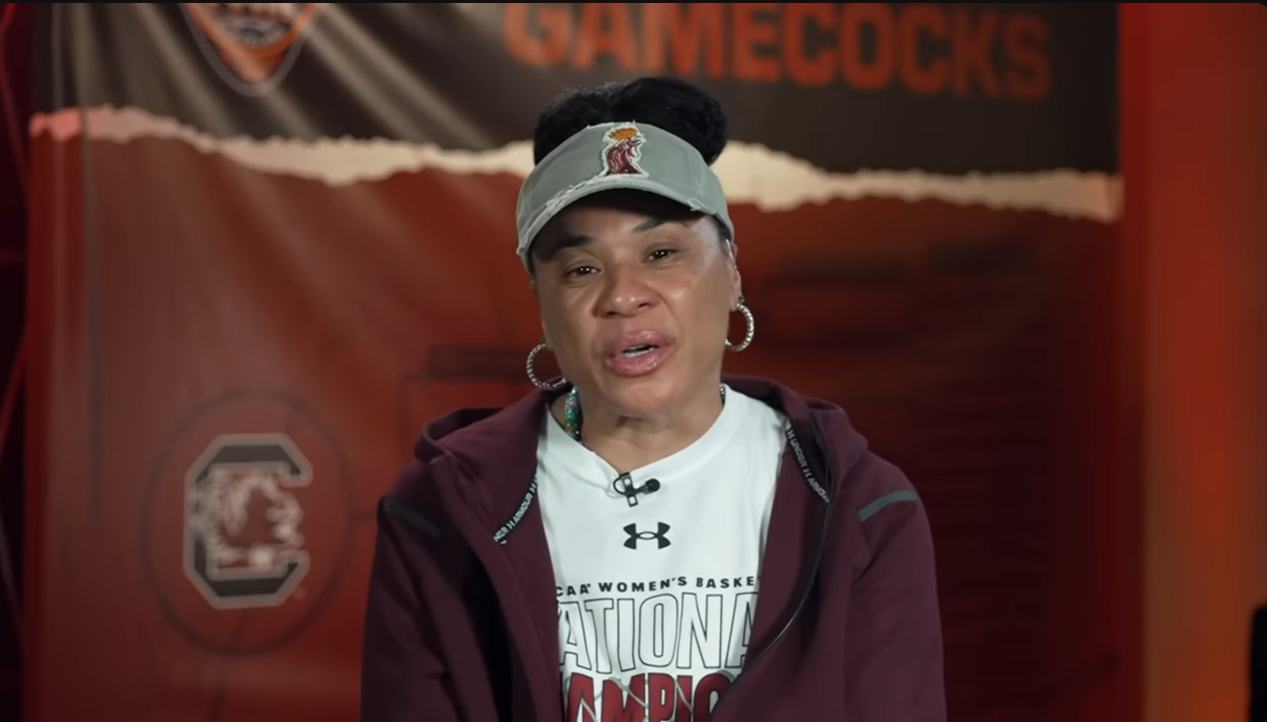
If not for a conservative transphobic blogger, this moment should be a celebration of NCAA women’s basketball coach Dawn Staley and the women of the South Carolina Gamecocks.
On Sunday, they concluded their undefeated season with a decisive win and a championship title. But when Staley faced reporters before that big game, Outkick’s Dan Zakheske asked her an irrelevant, clickbait question about transgender women in sports, referring to them as “biological males.”
Staley could have ignored the question, or stated she had no opinion, but instead the legendary coach offered a crystal clear endorsement of trans women competing in women’s sports, something outlawed in her home state of South Carolina for girls in kindergarten through college.
“I’m of the opinion,” said Staley, “If you’re a woman, you should play. If you consider yourself a woman and you want to play sports or vice versa, you should be able to play. That’s my opinion.”
Zakheske clearly wasn’t satisfied with that declaration of allyship and Staley swiftly cut him off.
“You want me to go deeper?” she asked.
“Do you think transgender women should be able to participate,” he started to say, when the coach stole the ball and took it downtown on a fastbreak. “That’s the question you want to ask? I’ll give you that. Yes. Yes. So, now the barnstormer people are going to flood my timeline and be a distraction to me on one of the biggest days of our game, and I’m okay with that. I really am.”
Staley is herself a Hall of Fame player a leading voice for diversity.
Reaction to her comments were swift, from LGBTQ rights organizations, athletes and inclusion opponents.
“Coach Staley simply spoke the truth that trans women are women and should play if they want,” said Sarah Kate Ellis, president and CEO of GLAAD, in a post on Instagram. “All of us can take a page from Coach Staley’s playbook as a sports leader and as a person of high integrity guided by faith, compassion and common sense.”
A White House pool reporter revealed President Joe Biden called Staley Sunday evening to congratulate her and the Gamecocks on their championship win. But it’s not clear if she and the president, an outspoken supporter of trans rights, discussed her remarks on trans athletes.
A number of Black leaders in the LGBTQ movement applauded Staley for taking a stand.
“Coach Staley has always been a trailblazer, but she’s also shown that true leadership is about advancing justice and equality for everyone,” said Human Rights Campaign President Kelley Robinson. “By expressing her full-throated support for transgender athletes’ inclusion in sports, she’s sending an important message — our shared humanity matters.
“Coach Staley showed courage and vulnerability, in choosing to answer the question and make a powerful statement of support for trans people on one of the biggest days and biggest stages in sports history,” said Kierra Johnson, executive director of the National LGBTQ Task Force, in a statement. “Not only does that make her a leader we can all aspire to like, it makes her a class act. She has etched her legacy in the history books with her play, her coaching, her heart and her smarts.”
In congratulating Staley on her championship title victory, Dr. David J. Johns, the CEO and executive director of the National Black Justice Coalition, also commended her for “her unwavering advocacy and support for transgender people in sports.”
“In a time when transgender athetes face unjust scrutiny, discrimination and exclusion from the National Association of Intercollegiate Athletics, her courage to speak truth to power and in support of inclusion and fairness sets a powerful example for us all, and is a testament to her integrity and compassion.”
The NBJC leader was referring to Monday’s announcement by the NAIA, the governing body of athletic programs at small colleges nationwide, voting 20-0 to essentially ban trans women from competing with other women beginning Aug. 1, as ESPN reported.
“It is a shocking and devastating development that the NAIA, an organization that has done so much to open doors, is now slamming those doors shut on transgender athletes,” said Sasha Buchert, Lambda Legal’s senior attorney and director of the organization’s nonbinary and trans rights project.
“Instead of standing up in support of transgender young people, the NAIA has simply turned its back on them — permanently depriving them of the benefits of competition. Would that they had the courage of victorious University of South Carolina women’s basketball coach Dawn Staley, who didn’t miss a beat in clarifying that transgender women should be able to play.”
However, praise for Staley’s stance was not universal.
Riley Gaines, failed former college swimmer and paid shill for the anti-inclusion organization, Independent Women’s Forum, called Staley “entirely incompetent or a sell-out” on Fox News. “Personally, I don’t think she believes what she said.”
Gaines has turned her fifth-place tie with out trans NCAA champion Lia Thomas into a career as a crusader against inclusion and a former advisor to the presidential campaign of Florida Gov. Ron DeSantis.
Val Whiting, a former Stanford University and professional women’s basketball player, tweeted her strong disagreement with Staley. “A lot of my basketball sisters feel differently but trans women do not belong in women’s sports. It’s not fair nor safe for biological women. There has to be another solution for trans women to be able to compete athletically besides having them compete against biological women.”
A lot of my basketball sisters feel differently but trans women do not belong in women’s sports. It’s not fair nor safe for biological women. There has to be another solution for trans women to be able to compete athletically besides having them compete against biological women.
— Val Whiting (@iamcoachval) April 7, 2024
Zaksheske’s Outkick colleague, anti-trans pundit David Hookstead, also went all-in with a transphobic post.
“Dawn Staley says she supports men who identify as women competing against real women in sports. Her view could literally destroy women’s basketball forever. Why won’t more people stand up for women?”
Dawn Staley says she supports men who identify as women competing against real women in sports.
— David Hookstead (@dhookstead) April 6, 2024
Her view could literally destroy women’s basketball forever.
Why won’t more people stand up for women? pic.twitter.com/2A59KTqvHb
Hookstead then boasted that Staley blocked his account.
Republican South Carolina Congresswoman Nancy Mace retweeted Zaksheske’s account of his interaction with Staley, calling her support of trans athletes “absolute lunacy.” That in turn won praise from Caitlyn Jenner, who retweeted Whiting and posted her thanks to Mace, along with this comment: “There is nothing complicated about this issue!”
What is complicated is that Jenner has never explained why she has competed with cisgender women in golf ever since her transition almost a decade ago.
You’re a hypocrite. pic.twitter.com/42DKwA9jmF
— Art Candee 🍿🥤 (@ArtCandee) April 7, 2024
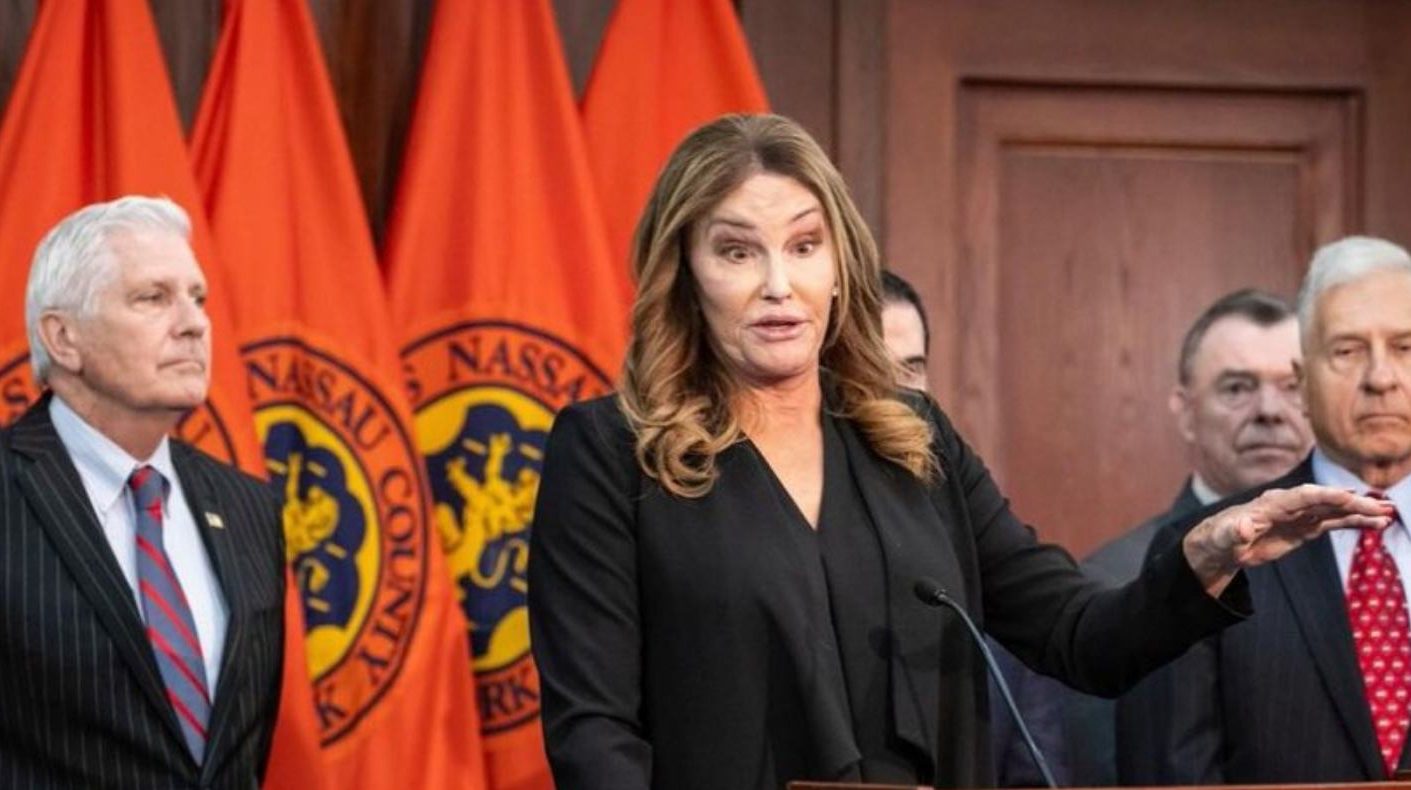
Caitlyn Jenner flew from Malibu to New York this week to join her fellow Republicans in their nationwide quest to keep transgender girls and women from competing in sports with other women.
“Let’s stop it now while we can,” said the Olympic gold medalist, at a news conference carried live by Fox News Channel.
Republican Nassau County Executive Bruce Blakeman organized the event so that Jenner could speak in support of his February executive order banning trans athletes at more than 100 county-owned facilities.
“Trans women are competing against women, taking valuable opportunities for the long-protected class under Title IX and causing physical harm,” said Jenner without providing supportive evidence of her claim. Jenner said the ban would defeat “the woke agenda.”
Her comments drew praise from former NCAA swimmer and paid shill Riley Gaines, who represents the Independent Women’s Forum and has also worked with the failed presidential campaign of Republican Gov. Ron DeSantis of Florida on his anti-trans athlete platform.
We stand with Executive Blakeman as he faces shameful retaliation from @TishJames for merely protecting sports on the basis of sex
— Riley Gaines (@Riley_Gaines_) March 18, 2024
Thanks to you both, @Caitlyn_Jenner @NassauExec !!👏🏼 https://t.co/vAsWfayI7l
“If the left wants to fight this battle on this hill, it’s a losing battle,” said Jenner. “We will win the battle.” She claimed she spoke on behalf of women and girls, contradicting her past statements in support of trans girls competing according to their gender identity and despite the fact she herself still competes in women’s sports.
Shortly after the ban was announced last month, New York State Attorney General Letitia James and New York Gov. Kathy Hochul, both Democrats, denounced it and accused Blakeman of “bullying trans kids.”
James called the order “transphobic and deeply dangerous,” and argued that it violates the state’s anti-discrimination laws. The state attorney general challenged it in court March 1 with a “cease and desist letter,” demanding that Blakeman rescind the order, saying it subjects women’s and girls’ sports teams to “invasive questioning.”
As the Los Angeles Blade reported, Blakeman’s legal team countered with its own lawsuit on March 5, claiming her cease and desist letter violates the 14th Amendment’s equal protection clause.
“Not only was the executive order legal, but we had an obligation to defend it,” Blakeman said Monday.
The order has also been challenged by the New York Civil Liberties Union, which filed suit last week on behalf of a women’s roller derby league based in Nassau County that welcomes trans women and would be barred from using the county’s facilities by Blakeman’s executive order.
Just days before the Long Island news conference, Jenner joined Olympian Sharron Davies, who also campaigns against trans inclusion in sports, for an conversation with a British newspaper, the Telegraph, which has been outspoken against trans inclusion.
They recalled that in their day, tests to determine sex were mandatory in order to compete, and Jenner said she has been “pushing” for sex tests to return to sports, decades after sports organizations around the world abandoned the practice because they were unreliable. “If they continue down this road, it will be pretty much the end of women’s sport as we know it.”
“I can still hit a golf ball 280 yards,” Jenner continued, not mentioning she plays from the ladies’ tee. She did however opine about not being “a real woman,” acknowledging that many trans women disagree with her view.
“They keep saying, ‘Oh, I’m a real woman, I’m a real woman,’ and I’m going, ‘No, you’re not,’” said Jenner. “I will use your preferred pronouns, I will treat you as a female, you can run and dress and do whatever you want, I have nothing against that, it’s fine, but biologically you’re still male.”
She added: “Let me explain — I am biologically male, OK? I’m XY. There’s nothing I can do to change that. If you believe in gender dysphoria, and I think most people do realize it’s not a disease, it’s a mental condition, just like some people are left-handed and some people are right-handed, it’s kind of the way you’re born and I’ve dealt with it my entire life.“
“I consider myself a trans person, I am still genetically male, I changed all of my ID right down to my birth certificate so technically yes, I am female, but on the other hand I know I’m not.”
Related:
Sports
Former UMD basketball player Abby Meyers discusses lesbians in sports, March Madness
Potomac native signed with the London Lions last August
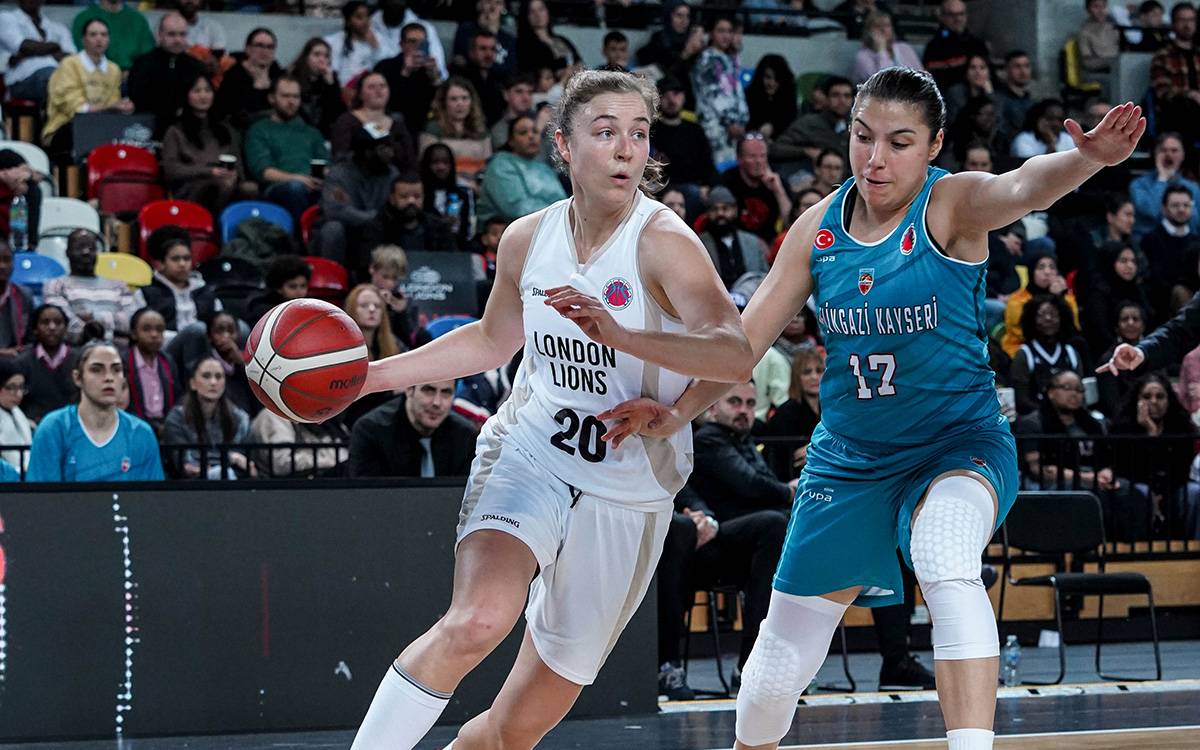
Star basketball player Abby Meyers signed with the London Lions last August, but she called Maryland home before calling the shots in London.
Meyers, a lesbian shooting guard, grew up in Potomac and graduated from Walt Whitman High School in 2017. She played for Princeton in her undergraduate years and played for the University of Maryland during graduate school.
She began playing basketball in elementary school, and she was already showing an abundance of potential by the time she was in high school.
In her freshman year of high school, the school’s basketball coach sat down with Meyers and her family and showed them a list of universities with Division I basketball teams. Meyers circled the names of the schools that she was interested in attending. From there, the doors leading to a collegiate basketball career began to open. She began working towards her dream and ended up playing for Princeton.
“It was kind of like a mutual understanding between the two of us, me and basketball,” Meyers told the Washington Blade. “I took more individual lessons, and I just realized that the potential was sky high.”
She came back to her home state to attend the University of Maryland not only for its business program but also for its celebrated basketball team.
“I grew up watching Alyssa Thomas, Shatori Walker-Kimbrough and so many other legends that passed through that program,” Meyers said. “So for me, I knew that basketball-wise, it was the best decision I could make. … They definitely had all of the qualities to make me the best player I could be.”
Before shipping off to London, Meyers briefly played in the WNBA for the Washington Mystics in the summer of 2023. In fact, the aforementioned UMD alum Shatori Walker-Kimbrough was one of her teammates.
She described her time with the WNBA and in London so far as a “learning experience.”
“I got to relearn what it meant to be a rookie again,” Meyers said. “All of a sudden you enter a new team, a new level and you’re at the bottom, and you just have to let your actions speak louder than your words.”
Meyers publicly came out around 2019, and since then she has been a role model for many other lesbian women in sports.
“By coming out I’m actually being my authentic self, but I was scared that people were going to judge me and look at me differently when in fact, I was met with open arms, love, and appreciation,” Meyers said.
Meyers believes the journey one takes to coming out is an individual process that looks different for everyone.
“At the end of the day, it’s your own race; run it at your own pace,” Meyers said. “Never be apologetic for who you are. When you have to start compromising yourself and your values for other people like though that’s not the community you want to be a part of.”
She has not experienced much anti-LGBTQ stigma since coming out, but that does not mean that it does not exist in other sports communities. However, in this modern social climate, Meyers pointed out, people are much more accepting of gay women in sports.
Nina Hazra, a University of Maryland medical student, grew up playing basketball with Meyers. The two were on the same team in middle school, but they went to different high schools and would often play against each other.
Hazra did not play much past high school, but she remained close friends with her former teammate and rival to this day. She went to most of the home games during Meyers’ stint at UMD.
Though Hazra does not identify with the LGBTQ community, she noticed a tension in the sports world that affects all women, regardless of sexuality. However, with today’s shifting climate, it has become easier for female athletes to express their identities
“Women who express strong emotions in sports are often treated differently than men who do the exact same thing,” Hazra said in an interview. “I feel like as we’ve gotten older, there’s been a lot more celebration of womanhood in whatever form in sports, and I think that’s one of the places where you can then kind of go outside those societal norms.”
But Hazra still noticed the impact Meyers had on younger generations in sports who may be struggling with their identities.
“It doesn’t matter your sexuality, your gender identity, all that stuff. That doesn’t matter when you’re playing a sport,” Hazra said. “A lot of us didn’t have role models in those years growing up and just to get to see her being that for so many girls is so amazing.”
Elisa Pinzan, also a former Terrapin, is good friends with Meyers.
Originally from Italy, Pinzan played for the University of South Florida for four years before entering the transfer portal and landing at UMD. She now plays for Keflavik IF in Iceland.
Pinzan and Meyers formed a strong bond while playing for the Terrapins together.
“She was the first person I got close to; she is very open, smiley and friendly, and I felt comfortable around her from the first day,” Pinzan described. “I am glad to have met someone like Abby, with such a kind soul.”
Pinzan thought that fans should keep their eyes peeled for the Terrapins this upcoming March Madness season.
“They are a very young team with energy, enthusiasm and grit on the floor, and I think they are a lot better than the record they have,” Pinzan wrote about the Terrapins in an interview. “Despite being young though, they are learning a lot every game and I am sure they will be able to transfer these lessons for the best time of the year coming up.”
Meyers agreed that there is a lot to look forward to this March Madness. She said that with Coach Brenda Frese’s game plans and strong assistant staff, the Terrapins have a strong chance of advancing throughout the competition.
According to Meyers, March Madness will be different for women’s basketball this year, pointing out that it’s more popular right now than men’s games, as women’s basketball is selling out arenas.
“I only think it’s gonna get better and it’s going to grow even more,” Meyers said. “Just the marketing, the social media, the overall awareness of the women’s game. Fans are growing by the number.”
Meyers believes that female basketball players have to rely more on their skill than their athleticism, which she believes makes women’s games just as — if not more — exciting than men’s games. She said that over the past few years, there has been a strong shift in women’s viewership that has shrunk the gap between men’s and women’s basketball, including from a technical standpoint, given that men and women play with the same level of equipment.
Regardless of where UMD ends up this March Madness, Meyers will be cheering the Terrapins on from across the pond — especially the women.
-

 European Union5 days ago
European Union5 days agoGay Polish government minister represents change of course
-

 Opinions5 days ago
Opinions5 days agoNetanyahu must go!
-

 LGBTQ Non-Profit Organizations4 days ago
LGBTQ Non-Profit Organizations4 days agoDay of [no] silence, a call to speak out against anti-LGBTQ+ hate
-

 Colorado3 days ago
Colorado3 days agoFive transgender, nonbinary ICE detainees allege mistreatment at Colo. detention center


